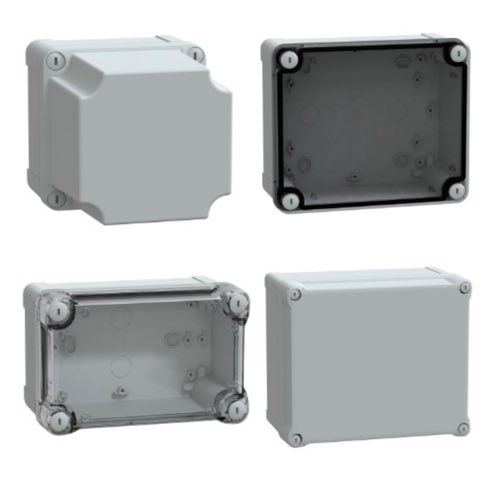Schneider Electric ABS Enclosures

Schneider Electric ABS wall-mount enclosures are designed to protect electrical and electronic components in indoor and light industrial environments. Manufactured from high-quality ABS (Acrylonitrile Butadiene Styrene) thermoplastic, these enclosures offer an excellent balance of lightweight construction, impact resistance, and durability. Their compact, wall-mounted design makes them well-suited for control panels, junction boxes, and instrumentation enclosures where space efficiency is important.
ABS is known for its strong electrical insulation properties and resistance to moisture and many chemicals. Because it is non-conductive, ABS provides inherent electrical safety while eliminating concerns related to corrosion that are common with metal enclosures. These characteristics make Schneider Electric ABS enclosures a practical solution for applications requiring reliable protection in clean, indoor environments.
Schneider Electric ABS enclosures are commonly used in industries that require non-metallic housings for sensitive electronics, including manufacturing, automation, utilities, and commercial facilities. When properly installed and secured, they provide dependable protection and tamper resistance comparable to metallic enclosures while offering the benefits of reduced weight and corrosion resistance.
FAQs
Q: What are Schneider Electric ABS enclosures used for?
They are used to house and protect electrical and electronic equipment in indoor and light industrial applications.
Q: What material are ABS enclosures made from?
They are made from Acrylonitrile Butadiene Styrene (ABS), a durable thermoplastic known for impact resistance and electrical insulation.
Q: Are ABS enclosures non-conductive?
Yes. ABS is a non-conductive material, which helps improve electrical safety and prevents corrosion.
Q: Are ABS enclosures suitable for outdoor use?
ABS enclosures are primarily intended for indoor use. For harsh outdoor environments, materials such as fiberglass or polyester are typically recommended.
Q: Can components be grounded to an ABS enclosure?
No. Because ABS is non-conductive, components cannot be grounded to the enclosure itself, but proper grounding methods can still be implemented within the system.
Why Buy Schneider Electric ABS Enclosures from RSP Supply
RSP Supply offers a full selection of Schneider Electric ABS wall-mount non-metallic enclosures to support reliable electrical installations. Customers rely on RSP Supply for knowledgeable technical support and dependable access to enclosure solutions that provide durable protection, electrical insulation, and long-term performance for industrial and commercial applications.

